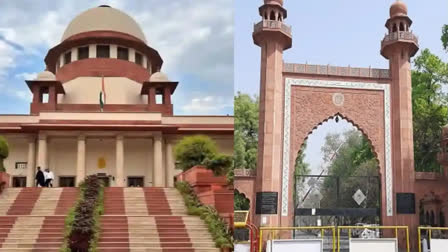New Delhi:The Supreme Court Wednesday told a counsel appearing for original petitioners and arguing against granting minority status to Aligarh Muslim University (AMU) that in the eagerness to uphold the striking down of the 1981 AMU (Amendment) Act, “let us not do something which substantially cripples the power of Parliament”.
On the line of argument chosen by the counsel, the apex court stressed that it “should not be doing something which substantially mutes the powers of the Parliament for future…” In 1967, a five-judge constitution bench in the S Azeez Basha versus Union of India case in 1967 held that since the Aligarh Muslim University was a central university, it cannot be considered a minority institution. The university got back its minority status when Parliament passed the AMU (Amendment) Act in 1981.
A seven-judge bench led by the Chief Justice of India and comprising Justices Sanjiv Khanna, Surya Kant, J B Pardiwala, Dipankar Datta, Manoj Misra and Satish Chandra Sharma, is hearing a batch of petitions regarding the minority status of AMU. Senior advocate N K Kaul, representing some original petitioners, said that by deletion of the word established and amending the definition of university, “you cannot remove the basis of Basha which recognizes the historical fact..... Basha recognizes the historical facts regarding AMU.”
Kaul insisted that change in legislative history is not possible in the manner in which the 1981 Act is seeking to do and that cannot happen, “one cannot change legislative history and a historical fact cannot be revised or altered either by a legal fiction or by a parliamentary fiat”. Kaul stressed that a historical fact remains a historical fact. He said a legal provision can be changed but how could one remove a historical fact, and also by a subsequent legislation cannot deny the fact.
Kaul said the fact is that an Act came into being and Muhammadan Anglo-Oriental (MAO) College was dissolved by 1920 Act, and the fact is a new university came into existence after negotiations. The Centre had told the Supreme Court that AMU surrendered its minority character when it was conferred with the university status under the 1920 AMU Act.
Kaul contended that parliamentarian Somnath Chatterji had categorically said an institution was established in a manner, such a manner of establishment cannot be changed through retrospective legislation, as legislation cannot change history.
At this juncture, CJI said when Parliament deleted the word established by 1981 amendment, then the entire incorporation of the university would have to come to an end, but possibly it was open to Parliament to take a particular view that what the 1920 Act did was to give it a form of a statutory university but that does not dilute the fact that it was established by Muslim.
“That 1981 Act does not take away the basis of Basha, you may be on firmer ground because the 1981 Act makes no changes to administrative provisions of the 1920 Act, it leaves them intact…”, observed the CJI.
